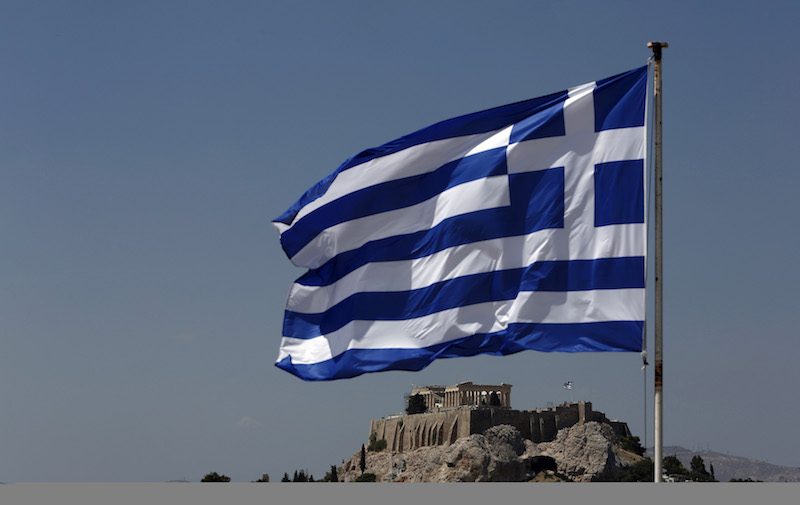The problem could be solved tomorrow through the usual remedy of significant debt write-offs
By Jonathon Bond
6 October 2018
‘Now Greece can finally turn the page in a crisis that has lasted too long. The worst is over.’ With these triumphant words, Pierre Moscovici, the EU Commissioner for Economic and Financial Affairs, declared an end to the EU’s eight-year €289 billion bailout programme to Greece, the largest rescue in financial history.
Except Greece’s financial crisis isn’t by any means over — and the EU’s blithe and self-congratulatory announcement is a stain on Brussels’s moral authority. As a Greek property owner, a committed Grecophile and a disappointed Remoaner, I have witnessed with rising horror the slow water-boarding of the Greek population over the last eight years. Every one of my Greek friends has a tale to tell of families under intolerable pressure, of parents forced to leave their infant children to seek work overseas, and of grandparents funding two generations of unemployed adults from their diminishing savings and from meagre pensions already savagely cut by the EU.
The EU has enforced a 25 per cent contraction in the size of the Greek economy during the last eight years (more severe than the great American depression of the 1930s) and its fiscal punishments have caused youth unemployment to reach a staggering 44 per cent.
In which economic textbook does allowing Greece’s debt to GDP ratio to grow (not reduce) from 120 per cent in 2010 (when it was already considered unsustainable) to 180 per cent by 2060 signal a return to economic normality? Every rule in the book has been set aside in the EU-ECB-IMF troika’s cowardly decision to heap more loans onto an already insolvent nation. Perhaps someone should have checked what was in his water glass when Mario Centeno, president of the eurozone group of finance ministers, said back in June: ‘With all these measures we can safely say that Greek debt is sustainable going forward.’
The evidence is everywhere to be found that Greece is slowly dying under its EU-induced euthanasia. At Easter, I spoke to newly ordained monks on Mount Athos — who have retreated to the Byzantine calm of the Holy Mountain to escape the agonies of modern domestic Greek life on the EU’s rack. My neighbour, a fully qualified accountant who lost her office job in 2010, says her parents’ monthly pension was reduced from €980 to €600 last year under government cuts. Her young daughter’s heart operation can no longer be under-taken at Corfu’s brand-new Ionian Islands hospital because its annual budget was recently slashed by 50 per cent.
Greece isn’t the poorest member of the EU — poverty rates are higher in Bulgaria and Romania — but it is close behind in third place, with over a fifth of the population now ‘severely materially deprived’ in 2015 according to Eurostat (up from 2 per cent in 2009 before the crisis began). Whereas the figures have been dropping sharply for her Balkan neighbours, the rate for Greece has doubled since 2008 (to 22 per cent, against an EU average of 8 per cent). The EU itself estimates that one in three Greeks currently lives ‘in a situation at risk of poverty or social exclusion’. These are shocking figures.
Notwithstanding my deeply held support for the 60-year European integration project, it’s no longer possible for me to look away from the tragic toll being exacted on 11 million Greeks by the EU’s cruelty. I have been forced to acknowledge that what Greece is enduring no longer meets the preferred explanation discussed around the dinner tables of northern, Protestant-work-ethic Europe: that Greece needed a harsh dose of corrective austerity in order to end for once and for all her Byzantine levels of corruption and clientilism.
No, what is happening is without precedent in EU history: the deliberate, slow destruction of a small and vulnerable society of fellow Europeans, all in the name of financial prudence and necessity.
Analysts estimate that some €230 billion (80 per cent) of the €290 billion eight-year rescue package has gone straight to European banks, bypassing the stricken Greeks altogether. As Yanis Varoufakis, the rock-star former finance minister and the bane of Brussels, has said: ‘Greece didn’t get a bailout.’ The bailout went ‘primarily to French and German banks’.
Somewhere in all of this, a cardinal rule of international banking seems to have been forgotten. As a recent Bloomberg editorial recently put it: ‘Irresponsible borrowers can’t exist without irresponsible lenders. German banks were Greece’s enablers.’
The chances of Greece fulfilling the EU’s surreal 2060 projections must surely be negligible — the debt reduction and privatisation targets arbitrarily set by her puppet-masters will inevitably be blown off-course during the next recession, doubtless necessitating further cuts in Greek pensions and public services to save Brussels’s blushes.
Of course, none of the austerity savings will go towards the productive investment which Greece so badly needs: in infrastructure, education and industry. Greece currently ranks 67 in the World Bank’s ranking for ease of doing business, even lower than its much-maligned neighbour Albania.
Prime Minister Alexis Tsipras announced in early September a range of relief measures (raising public sector wages, cutting taxes and increasing welfare spending) but sceptical Greeks might be forgiven for dismissing these as pre-election manoeuvres. Tsipras’s deeply unpopular Syriza government (in power since 2015) must face elections before next September and is significantly behind the main centre right opposition New Democracy in recent polls.
Any and all funds raised through austerity cuts and privatisations in future have been pledged to repaying EU loans for the next 50 years. The Bank of Greece estimates that the Greek population has fallen by 3 per cent in the last eight years owing to a falling birth rate (a sure sign of a society’s diminishing confidence in its future) and to the decision of some 420,000 Greeks of working age to seek work overseas (mostly in Germany, the UK and the UAE). These are the talented and thrusting young professionals the economy needs to achieve a recovery.
Even the IMF is not prepared to put its reputation behind the most recent EU announcements, having lost the argument against the EU’s unrealistic demands that Greece must run a budget surplus of 3.5 per cent of GDP until 2022 and 2 per cent thereafter (the country has only achieved a budget surplus on five occasions since 1945, largely owing to low savings rates and significant capital flight, perhaps not altogether unconnected with long memories of the Greek population’s abysmal treatment in earlier debt crises). These demands are at best unrealistic and at worst plain sadistic, for an economy that has already endured eight years of EU-imposed strangulation.
Everybody, except the most obtuse Brussels bureaucrat, knows the problem could be solved tomorrow through the usual remedy of significant debt write-offs by the European banks. In this case, Greece urgently needs some €150 billion (50 per cent) of its debt forgiven — and it’s a question of when, not if, these haircuts are finally achieved and at what cost to the welfare of Greece in the interim. It’s a fair guess that very few of the record 32 million tourists (nearly three million of them from the UK) expected to have visited Greece in 2018 will be aware of the economic waterboarding that their smiling Greek hosts are currently enduring.
So why has the EU been so hidebound, so deaf to the appeals of reason and to the suffering of the Greeks? The reasons for this shameful situation appear to be some diabolical combination of the utter geo-political insignificance of Greece under Alexis Tsipras’s Syriza government and the Greek population’s remarkable resilience. The Greeks haven’t taken to the barricades with sufficient vigour to embarrass Brussels.
Perhaps that’s because the Greeks have grown accustomed to inhuman treatment at the hands of European governments. Four times in the last 200 years Greece has experienced national bankruptcy: in 1833, 1898, 1912, and most recently 2009. On each occasion, a different set of European powers has prioritised the interests of their bankers (whose over-optimistic lending caused the problems in the first place) over the welfare of the Greek population, and on each occasion Greece’s national bankruptcy took a shockingly long time to resolve.
For Brexit Britain, the lesson of the last eight years is that Brussels is quite capable of inflicting policies of self-defeating pain on fellow Europeans if the victim is a small and friendless country on Europe’s boundaries. Even so, the battered Greeks are rumoured to be seeking to take advantage of Theresa May’s Brexit frailties by requesting a few weeks back that we re-open negotiations for the return of the Elgin Marbles to Athens — and why not?
As my local priest, Papas Yiorgas, says: ‘Greece has been abandoned by God and we Greeks must pray for a revival of the spirit of the War of Independence. Who will lead us to victory against the new Ottomans in Brussels?’
* Jonathon Bond is writing a biography of Count Ioannis Capodistrias (1776–1831), Russian foreign minister under Tsar Alexander I and modern Greece’s assassinated first president.
Published at https://www.spectator.co.uk/2018/10/a-greek-tragedy-how-the-eu-is-destroying-a-country/











